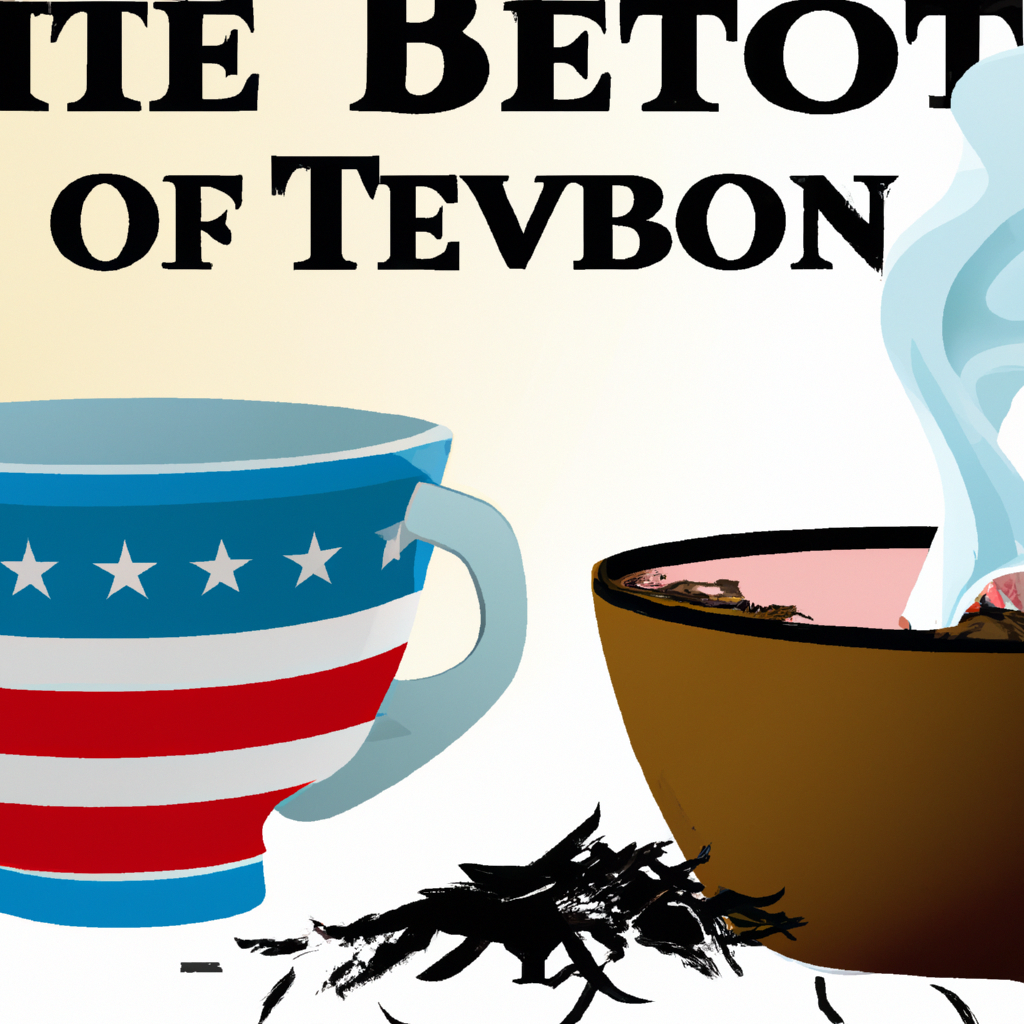The infamous Boston Tea Party of 1773 sparked a movement of revolutionary ideals within the Colonies of America. Seen as a foundational event of the American Revolution, this defiant act of colonial resistance continues to shape our nation’s core values and draw attention to our right for self-governance. This article will cover the effects of the Boston Tea Party, and the courage and determination of the men and women involved in this pivotal moment of history.
1. From Tax to Tea: Tracing the Path of Revolutionary Discontent
It is well known that protests and revolutions often start, when a population becomes disgruntled with their government. The tax system is often a primary target for citizens whose wallets are targeted by the state. In 1773, a protest against taxation was the spark that started the American Revolution. This was a shot heard around the world, inspiring many other movements of similar ilk.
In the late 18th and early 19th centuries multiple groups began to rally against the oppressive taxes levied against them for books, window glass, tea and other consumables by the East India Company. One of the most famous events of this era was the Boston Tea Party, an act of rebellion in which angry citizens threw casks of taxed tea into the local harbor.
Through the 19th and 20th centuries, this revolutionary discontent was channeled in a multitude of ways, some more violent than others. From the June Rebellion in France 1832 to the Protests against the Beer Tax in Germany in 1844 to the current Green Day protests in Pakistan, citizens have found ways to express their grievances in an attempt to gain personal or political freedoms.
In some cases, this discontent has succeeded. Early 20th century movements like the Indian Union Party helped gain India its independence from British rule, and the Tax Revolt of the 1980s resulted in new laws that allowed citizens to reclaim tax money when it is paid to the government in excess, due to incorrect calculations or fraud.
These protests have shown that citizens are not afraid to express their displeasure with their government, be it through a protest march or a teacup. And, although it may take time, this rebellious spirit has an effect, as it pressures governments to reconsider their policies. So, it appears that discontent can still spur change, even in a world of complexity and bureaucracy.

2. The Stirrings of a Revolution Brewing in Colonial America
By the mid 1700s, the stirrings of revolution had started to build in British Colonial America. The colonies had experienced a period of stability under Britain’s rule but were becoming increasingly dissatisfied with the lack of representation and taxation in Britain’s decisions. There was a growing sense of independence among the colonial American citizens and a general dissatisfaction with the status quo.
Oppressive Taxation
The primary cause of the brewing revolution was the oppressive taxation. The taxes that the colonies had to pay to Britain were increasing with no control from the colonists themselves and the funds gained were going back into Britain’s coffers instead of staying in the colonies where the money was earned. In 1765, for example, the passage of the Stamp Act imposed duties on nearly all printed materials in the colonies and sparked outrage and protest from the colonists. They were not able to vote out their representatives in protest and the taxation kept increasing, leading to a mounting sense of injustice.
Cultural Differences
Cultural differences between the American colonies and Britain had been present since the colonies had formed, but over the course of two hundred years those differences had grown significantly. As Europe experienced the changes wrought by the Enlightenment, American colonists had developed a different set of values and ideals. Economic endeavors had completely diverged, as the plantations of the South relied heavily on labour of slaves, whilst the north had developed an increasingly industrialized economy. This difference in perspective and culture between the colonies and Britain were a source of tension and created an environment in which revolution was possible.
Increased Political Pressure
Colonists had become increasingly aware of their lack of political representation and this led to further grievances. Despite growing population and economic developments, Britain did not increase representation for the colonies. Specifically, the lack of representation in the British Parliament for the colonies became a major complaint. The colonists saw the obvious unfairness of this situation.
To ease matters, the British government did propose several attempts at compromise. These allowed a degree of self-rule for the colonies while still under the control of Britain. Ultimately, these efforts were too little and too late, and only fanned the flames of unrest in the colonies.
By 1775, the brewing revolution in the American colonies was reaching its peak and the discontent of the colonists had become so great that it would soon lead to the War of Independence.
3. The Boston Tea Party: Taking a Stand Against Imperialism
The Boston Tea Party was a direct result of a series of broad taxation acts imposed by the British Empire on the colonies in the 1760s and 1770s. The colonists viewed these acts as heavy-handed and oppressive, a sign of the Empire’s diminishing respect for the rights of its American colonies.
The Boston Tea Party was an act of protest against the direct taxation of tea, and its implications for the Empire’s hold on the colonies. On the evening of December 16th, 1773, a band of colonists gathered in Boston Harbor and boarded three merchant ships carrying tea belonging to the East India Trading Company. Once on the boats, the colonists gathered two hundred ninety cases of tea and dumped them into the harbor.
The actions of the Boston Tea Party proved to be a significant turning point for the American colonies, their relationship with Britain, and the push for independence. It was the first organized political act in the American colonies, and it demonstrated to the rest of the colonies that a unified stand against imperialism was possible. The Boston Tea Party provided a foundation for future unified resistance to the British Crown, including the writing of the Declaration of Independence and the Revolutionary War.
The momentousness of the event is evident in its lasting symbolism and its use in current debates on imperialism and taxation. The phrase “no taxation without representation”, referring to the taxation acts imposed on the colonies without their consent, has been frequently used in more recent protests against oppressive regimes and high tax policies.
- The Boston Tea Party was a direct act against British taxation on the colonies.
- The act itself took place on the evening of December 16th, 1773, in Boston Harbor.
- It marked the beginning of a push for colonial independence from the British Empire, including the writing of the Declaration of Independence and the Revolutionary War.
- The phrase “no taxation without representation” arose from and continues to inform modern debates on imperialism and taxation.
4. The Aftermath of the Boston Tea Party: Spreading Discontent in the Colonies
The Boston Tea Party of 1773 was an extremely influential event in the cause of American independence. It was a remarkable demonstration of popular protest, and helped to galvanize people throughout the colonies. As news of the Boston Tea Party spread, it caused further unrest and discontent among the people living in the 13 colonies.
The Boston Tea Party was widely seen as a major cause of the American Revolution. It awakened an increased sense of resistance among the people to the actions of the British government. This was because most of the taxes that they imposed were perceived as unfair. The news of the importance of the Boston Tea Party spread quickly, and it became a powerful symbol throughout the United States. People began to see it as a form of protection and assertion against the whims of the British.
The sense of civil disobedience felt throughout the colonies coalesced into further collective action. Public demonstrations, such as the Boston Massacre, increased throughout the colonies. This helped to strengthen a unified sense of protest and a strong anti-British sentiment. Many of the criticism of the British was than disseminated through pamphlets and other mediums, which further increased awareness and dissent.
The effects of the Boston Tea Party spread to many other colonies. It was increasingly seen as a symbol of the need to assert colonial rights. This further led to joint demonstrations throughout the colonies, such as the Virginia Resolves of 1774, which were a series of protests against the British government and taxes.
The Boston Tea Party had a major impact in creating greater public awareness of the grievances of the colonists. This contributed to a unifying feeling of dissent and a willingness to stand up against the British. This ultimately laid the foundations of the American Revolution that began in 1775.
The Boston Tea Party remains a powerful reminder of what can be achieved when a few people join forces and stand up for what is right. No matter how long ago it occurred, the Boston Tea Party and its principles of commitment and patriotism continues to inspire generations of Americans.
